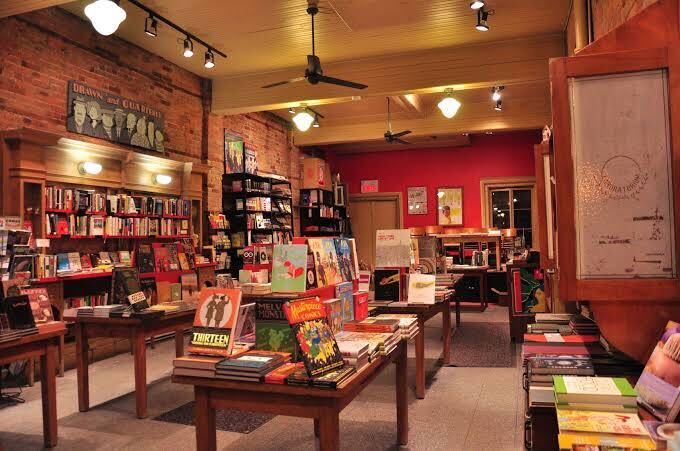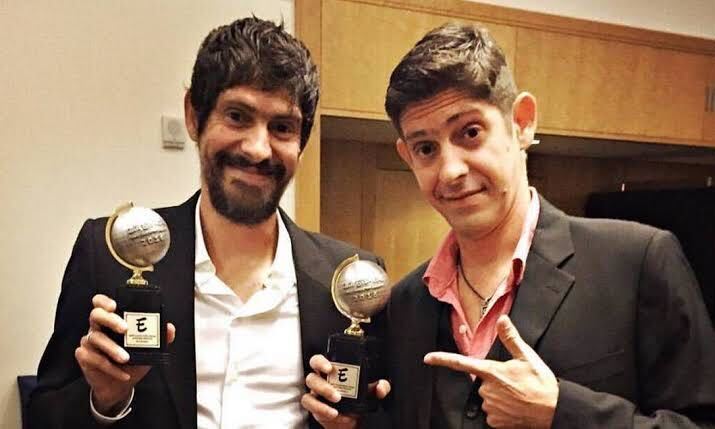Regular readers may recall ImaginAtlas’ coverage of Expozine last year, which lauded the event as “enough to instill in anyone a love for comics and the people who make them.” The same may be said of the far larger and better-funded Festival BD de Montréal (FBDM), which occupied five blocks of St-Denis Street from May 26 to 28. Yet the atmosphere of the two events could not be more different. Perhaps by virtue of being hidden away in an indoor venue next to a church in Rosemont, Expozine felt like a more local, insider affair—artists spoke amongst each other as much as to customers. The overall impression was of a tight-knit, inviting community one would love to be a part of.
At FBDM (MCAF for you Anglophones out there), by contrast, interactions were very much directed outwards. The Fest seemed designed to cater to random passersby and avid fans alike; a public face for the industry, calculated to dispel the unfortunate basement-dweller associations comics still carry in some quarters. True to that spirit, everyone manning the stands was friendly and eminently approachable, eager to dish on their own works as well as those that most influenced them, and the entire event was eminently accessible. With creators coming from far and wide, the local quality of Expozine was not really present, but in its place was the very real sense of a diverse band of artists united in (infectious) enthusiasm for their oft-overlooked art form.
ImaginAtlas spoke to sellers large and small at the Fest, starting with the aptly named Bloody Gore Comix. Paula, wife of publisher and founder Steph Dumais, told us that the venture began five years ago solely as a means for him to get his work out (primarily “Zombie Commandos From Hell!”—still one of their bestsellers), as it was considered “too trashy” for mainstream presses. As it turns out, plenty of other artists—and not only in Canada—were also in that limbo zone, and they soon found themselves putting out their work as well. Paula also shared that their Devilman-inspired Slaughtered Kingdom has been a recent hit. Indeed, as she spoke, a curious customer stopped by to leaf through it. The press’ print runs may be small and their audience select, given the extreme nature of their content (not for the faint of heart!), but they’ve evidently found their niche and made the most of it.
If Bloody Gore Comix represents one end of the vendor spectrum present at the Fest (though there were some indie solo artists, such as the unique A.T. Pratt, whose work seemed even more personal and specialized), then Drawn & Quarterly was all the way on the other side. One of the most influential graphic bookstores in Montreal, D&Q also commissions and publishes original graphic novels that balance mass appeal with unique artistic visions. ImaginAtlas spoke with staff members Jules and Mariana at their stall and asked them about the most exciting new titles they’re releasing. Fast-moving Gen-Z tale Girl Juice by Benji Nate, which they described as “the most fun a girl can have reading comics,” started life as a webcomic before being picked for publication. Along with Instagram sensation 20 km/h by Woshibai, this goes to show how more and more exciting new creators are entering the field from a purely digital starting point.

Yet, notably, many of D&Q’s hottest new titles are, in fact, translations. The absurdist cartoon collection Work-Life Balance by Aisha Franz was first published in German, while the podcast adaptation Corps Vivante is currently only available in French from local Franco press Pow Pow (also present at the Fest), but the forthcoming English version will be a D&Q release. With its premise centred on a domed city and monster hunting, the latter seems especially tantalizing—making the wait for the translation especially anxious for non-Francophones. Given the generally high standard the store’s press has set for itself, though, it’s sure to be worthwhile.
The Librairie Crossover Comics booth, for its part, offered an irresistible deal for any true comics aficionado: five issues (‘floppies’) for $5. As if this weren’t enough, the store also hosted the noted Brazilian artists Fábio Moon and Gabriel Bá, veterans of a world largely unrepresented at the Fest beyond them: superhero comics. Though they’ve provided art for Hellboy and The Umbrella Academy, among many others, most of the books they were signing were editions of Daytripper, their original graphic novel centred on a fictional Brazilian author’s life story. It felt in keeping with the spirit of the Fest in general, striking a happy medium between deeply felt personal expression and commercial success. Asked for advice for artists looking to break into the industry, Moon counselled against spending years creating one’s epic magnum opus; instead, it’s best to start creating as soon as possible and get one’s work out by whatever means possible.

Looking around at the nearby tents on the way back from the signing, it seemed all the vendors had followed that advice. And perhaps events like these might encourage others, previously intimidated by the industry or scornful of the medium, to do so as well. The Fest as a whole was refreshingly lacking in the familiar modern obstacles placed around fandom: all the signings were free of charge, there were no absurdly long lines to be seen, and the entire event was held on a public street, open to all. Perhaps Comic-Con could learn a thing or two if it truly wishes to bring more people into this strange, amazing world we call comics.
